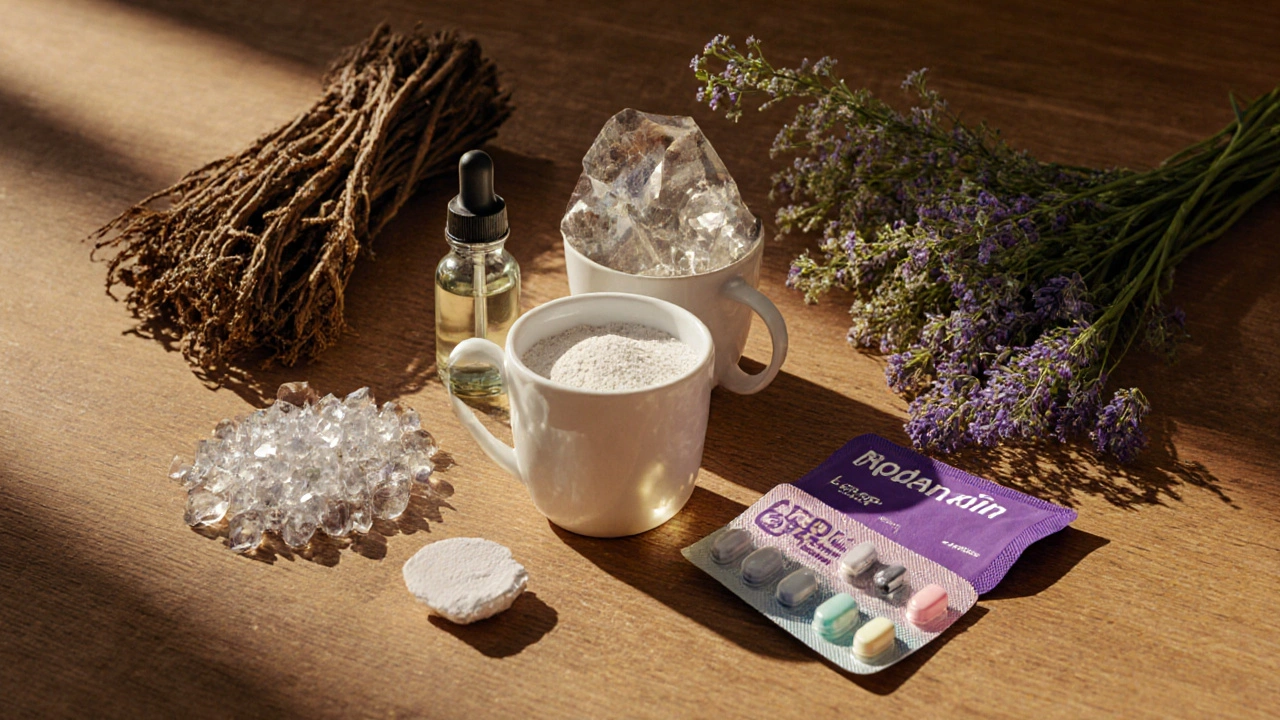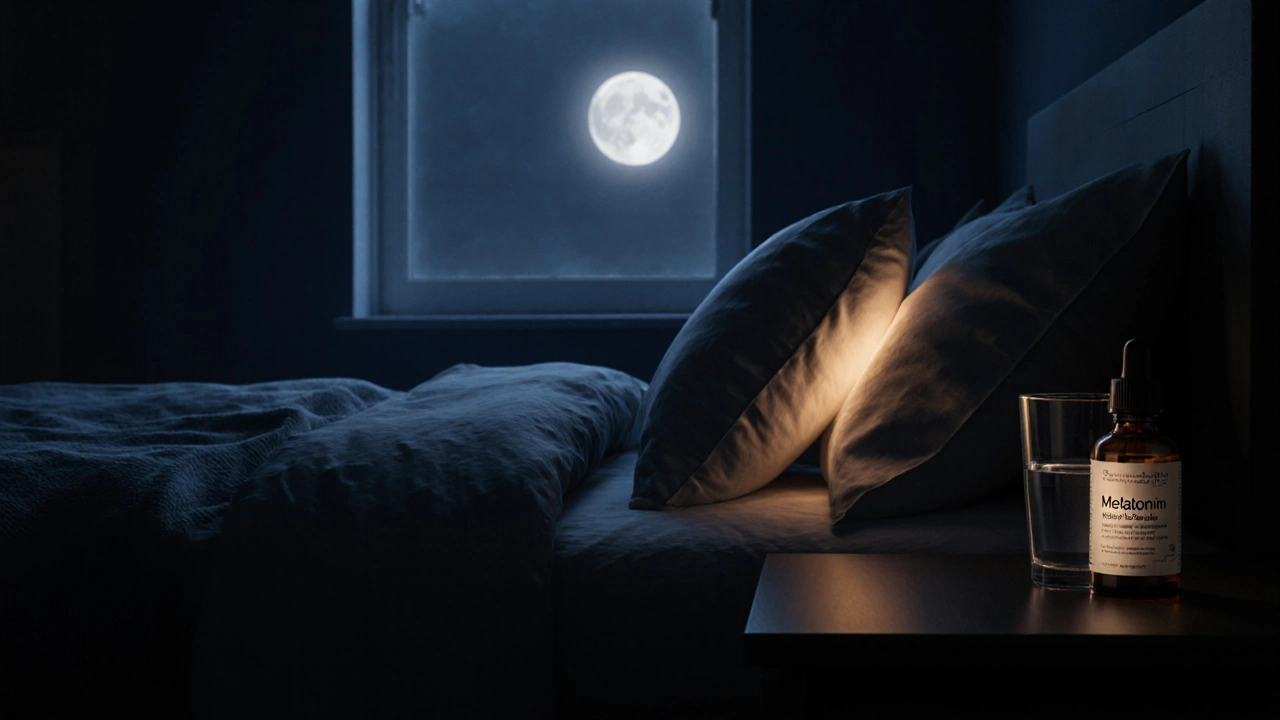Melatonin vs Natural Sleep Aids Decision Helper
Recommended Sleep Aid for You
This tool compares melatonin, valerian root, magnesium, L-theanine, CBD, zolpidem, 5-HTP, and chamomile based on your selected criteria.
Each option has different mechanisms, dosages, onset times, and side effects. Our recommendation considers your unique situation.
When you toss and turn at night, the first thing that comes to mind is often melatonin. But is it really the best option for every sleeper? This guide lines up melatonin side‑by‑side with the most popular alternatives so you can pick the right bedtime helper for your body.
How Melatonin Works
Melatonin is a hormone produced by the pineal gland that signals darkness to the brain. Its rise in the evening tells your circadian clock that it’s time to wind down, making it easier to fall asleep. Typical over‑the‑counter (OTC) doses range from 0.5mg to 5mg, taken 30‑60 minutes before bedtime. Because it works with the body’s natural rhythm, melatonin usually has a gentle onset and few next‑day grogginess issues, though some users report vivid dreams or mild headache.
Popular Alternatives at a Glance
Below are the eight most‑cited sleep‑supporting substances you’ll see on shelves or in research papers.
- Valerian root - a herbal extract used in Europe for centuries.
- Magnesium - an essential mineral that relaxes muscles and nerves.
- L‑Theanine - an amino acid found in tea that promotes calm without drowsiness.
- CBD (cannabidiol) - a non‑psychoactive cannabinoid gaining popularity for anxiety relief.
- Zolpidem (Ambien) - a prescription hypnotic that acts on GABA receptors.
- 5‑HTP - a serotonin precursor that can boost melatonin production.
- Chamomile - a gentle herb commonly brewed as tea.
- Melatonin - included again for direct side‑by‑side comparison.

Side‑by‑Side Comparison
| Ingredient | Mechanism | Typical Dose | Onset | Duration | Common Side Effects | Best For |
|---|---|---|---|---|---|---|
| Melatonin | Synchronizes circadian clock | 0.5‑5mg | 30‑60min | 4‑8h | Headache, vivid dreams | Shift‑work, jet lag |
| Valerian root | GABA‑enhancing, sedative | 400‑900mg | 1‑2h | 6‑10h | Stomach upset, drowsiness | People who like herbal teas |
| Magnesium | Muscle relaxation, nerve calming | 200‑400mg | 1‑2h | 6‑8h | Loose stools, nausea | Those with restless legs or cramps |
| L‑Theanine | Alpha‑brain wave promotion | 100‑200mg | 15‑30min | 4‑6h | Rare headache | Light sleepers who need calm focus |
| CBD | Endocannabinoid modulation | 10‑25mg | 30‑60min | 6‑8h | Dry mouth, mild dizziness | People with anxiety‑related insomnia |
| Zolpidem | GABA‑A receptor agonist | 5‑10mg | 15‑30min | 6‑8h | Memory issues, dependence | Severe insomnia under doctor guidance |
| 5‑HTP | Serotonin → melatonin boost | 50‑200mg | 45‑60min | 4‑7h | Nausea, heartburn | Those who want a natural melatonin boost |
| Chamomile | Apigenin‑driven mild sedation | 1‑2tsp tea | 15‑30min | 2‑4h | Allergic reactions (especially to Asteraceae) | Light sleepers who enjoy bedtime rituals |
Benefits & Drawbacks of Each Option
Understanding the pros and cons helps you avoid costly trial‑and‑error.
- Melatonin
- Pros: aligns with natural rhythm, low habit‑forming risk, inexpensive.
- Cons: variable effectiveness across age groups, may interfere with certain medications (e.g., blood thinners).
- Valerian root
- Pros: well‑studied in Europe, helps people who crave a herbal vibe.
- Cons: slower onset, taste can be off‑putting, occasional next‑day grogginess.
- Magnesium
- Pros: tackles muscle cramps and restless‑leg syndrome alongside sleep.
- Cons: GI upset at higher doses, not a direct sedative.
- L‑Theanine
- Pros: promotes calm without heavy sleepiness; works well with caffeine users.
- Cons: effect size modest; may need stacking with other agents.
- CBD
- Pros: reduces anxiety, can improve sleep architecture.
- Cons: legal landscape varies, product quality is inconsistent.
- Zolpidem
- Pros: powerful, fast‑acting, proven for acute insomnia.
- Cons: prescription only, risk of dependence, complex side‑effect profile.
- 5‑HTP
- Pros: boosts serotonin then melatonin, useful for mood‑linked sleep problems.
- Cons: interacts with SSRIs, can cause serotonin syndrome if misused.
- Chamomile
- Pros: soothing ritual, minimal side effects, cheap.
- Cons: effect is mild; not sufficient for chronic insomnia.
How to Choose the Right Sleep Aid for You
Follow this quick decision tree to land on a candidate that matches your lifestyle.
- Do you need a fast‑acting solution for a one‑night event?
- If yes, consider Zolpidem (doctor‑prescribed) or a higher melatonin dose (5mg).
- Is your insomnia linked to stress or anxiety?
- Try CBD or L‑Theanine for calm without heavy sedation.
- Do you experience muscle cramps or restless legs?
- Magnesium can address both sleep and muscle issues.
- Do you prefer a completely natural, ritual‑based approach?
- Chamomile tea or valerian root capsules fit the bill.
- Are you shifting time zones or working night shifts?
- Melatonin’s circadian‑resetting power is unmatched.
Remember to start with the lowest effective dose and give each option at least a week before judging.
Key Takeaways
- Melatonin is best for clock‑related sleep issues; it’s cheap and low‑risk.
- Herbal options (valerian, chamomile) are gentle but slower.
- Minerals and amino acids (magnesium, L‑theanine, 5‑HTP) add extra health benefits.
- CBD can calm anxiety‑driven wakefulness, but watch legal status.
- Prescription hypnotics like zolpidem are powerful but should be a last resort.
Frequently Asked Questions
Can I take melatonin every night?
Occasional use is safe for most adults. Daily long‑term use may blunt the body’s natural production, so doctors usually recommend cycling it-e.g., use for 2‑3 weeks, then pause a week.
Is valerian safe with melatonin?
Both act on GABA pathways, so stacking can increase sedation. It’s okay for short‑term use, but start with low doses and avoid driving the next day.
Which option helps restless leg syndrome?
Magnesium is the top OTC choice; it relaxes muscles and improves nerve signaling. Some people also benefit from a low dose of melatonin combined with magnesium.
Will CBD make me high?
No. CBD contains less than 0.3% THC, the psychoactive component of cannabis, so it won’t cause intoxication. It merely reduces anxiety and may improve sleep quality.
Is it okay to combine 5‑HTP with SSRIs?
Generally not recommended. Both raise serotonin levels and the combo can trigger serotonin syndrome-a rare but serious condition. Consult a physician before mixing.


olivia guerrero
October 6, 2025 AT 12:33Wow, this guide is super helpful!!! If you're battling jet lag or just need a gentle nudge into dreamland, melatonin can be a game‑changer!!! And the way you laid out the pros and cons of each option makes choosing feel way less overwhelming!!! Keep the awesome content coming!!!
Dominique Jacobs
October 9, 2025 AT 23:56Listen up, if you’re itching for a fast fix, hit the melatonin hard-but don’t forget to test the natural crew too!!! Mix a bit of L‑theanine for that calm focus, and if anxiety is the monster, toss in some CBD and you’ll crush those sleepless nights!!! Stay bold, stay experimental, and own your sleep game!!!
Claire Kondash
October 13, 2025 AT 11:19When we dive into the vast ocean of sleep‑aid options, we quickly realize that each compound carries its own philosophical narrative about how we negotiate rest and wakefulness.
Melatonin, for instance, whispers to our pineal gland like an ancient time‑keeper, urging the body to align with the celestial rhythm of night and day.
Valerian root, on the other hand, taps into the GABA pathways, offering a gentle sedative that feels more like a warm embrace than a chemical shove.
Magnesium acts as a quiet diplomat, cooling muscular tension and neuronal over‑excitement, which often translates into smoother transitions into sleep.
L‑theanine, a modest amino acid found in tea, cultivates alpha brain waves, fostering a state of relaxed alertness that many find ideal before bedtime.
CBD steps onto the stage with a promise of anxiety reduction, modulating the endocannabinoid system without the psychoactive high, thereby smoothing the emotional turbulence that keeps minds awake.
Zolpidem, the prescription powerhouse, delivers a rapid plunge into unconsciousness but demands respect for its dependence‑forming potential.
5‑HTP serves as a precursor, boosting serotonin levels which eventually cascade into melatonin synthesis, illustrating how interconnected our neurochemical pathways truly are.
Chamomile, the humble flower, offers a ritualistic calm through apigenin, inviting tranquility with each sip of tea.
Each of these agents, while distinct, shares the common goal of coaxing the brain away from the relentless chatter of the waking world.
Choosing among them requires a careful inventory of personal health conditions, timing needs, and tolerance for side effects.
For example, those suffering from restless leg syndrome may gravitate toward magnesium, while shift workers often find melatonin's clock‑resetting ability indispensable.
Moreover, the legal landscape surrounding CBD varies widely, making it essential to verify product quality before committing.
In the end, the most effective strategy may involve stacking complementary agents-like pairing magnesium with a low dose of melatonin-to address both muscular and circadian aspects of sleep.
🛌💤🌙
Matt Tait
October 16, 2025 AT 22:43Honestly, this article reads like a basic sales brochure and barely scratches the surface of the pharmacology-it's a lazy mash‑up that does a disservice to anyone seeking real insight.
Benton Myers
October 20, 2025 AT 10:06Interesting read.
Pat Mills
October 23, 2025 AT 21:29Let me set the record straight-America has been pioneering sleep research for decades, and yet this piece glosses over the robust clinical data supporting prescription options like zolpidem, which have saved countless nights for our citizens! While natural remedies have their charm, relying solely on chamomile or valerian without acknowledging their limited efficacy is a romanticized myth that many cling to. The federal guidelines clearly delineate when a controlled hypnotic is warranted, and dismissing that in favor of vague ‘natural’ buzzwords does a disservice to informed patients. Furthermore, the author neglects to mention the recent FDA alerts about counterfeit CBD products flooding the market, a serious public‑health concern! In sum, if you want a truly comprehensive guide, demand hard data, not just pretty tables, and recognize that sometimes a prescription is the pragmatic, not the evil, choice.
neethu Sreenivas
October 27, 2025 AT 07:53Your comparison does a wonderful job highlighting the spectrum of sleep aids, and I especially appreciate the clear breakdown of onset times; however, a minor point-‘magnesium’ should be capitalized consistently when referring to the supplement, and adding a note about potential interactions with blood pressure medications would make the guide even more user‑friendly 😊.
Keli Richards
October 30, 2025 AT 19:16Thanks for the thorough guide it’s very helpful and easy to follow
Ravikumar Padala
November 3, 2025 AT 06:39While the article attempts to be exhaustive it ends up feeling like a hurried collage of facts that never quite coalesce into a coherent recommendation, especially when the nuances of dosage adjustments for different age groups are brushed over in a single sentence that leaves the reader wondering about safety thresholds, and the lack of discussion on long‑term reliance on melatonin versus intermittent use of magnesium creates an imbalance that could mislead those seeking a sustainable solution, ultimately rendering the piece more of a superficial overview rather than a truly practical decision‑making tool.
King Shayne I
November 6, 2025 AT 18:03Yo this is messsy and dont even try to hide it its all over the place get a real writer!